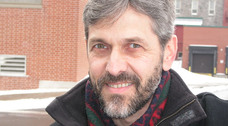2007-03-23

"I spend a lot of time in the community with patients. There's still a great deal of stigma, but attitudes are changing for the better," says Douglas psychologist Gilbert Tremblay. "Public education is making a difference."
Gilbert started his Douglas career as a beneficiary assistant in 1985, while studying to become a psychologist. When the ACT team was formed in 1997, Gilbert stepped up as an enthusiastic recruit. Since then, he and his ACT colleagues have helped hundreds of patients with severe and persistent mental illness to lead rewarding lives in the community.
"We were the first ACT team to be formed in Quebec," Gilbert explains proudly. "Whether a person needs support in finding an apartment, taking their meds on time, getting groceries, or learning to socialize - we're here to help."
Down-to-Earth
In addition to his ACT team responsibilities, Gilbert gives five to ten lectures annually in a variety of venues: hospitals, CLSCs, and provincial and international conferences. His audiences appreciate his down-to-earth talks on abuse, the ACT model and personality disorders, which he considers "a privilege to do". As if that's not enough, Gilbert's also been working for ten years with three employment assistance programs. His job is to counsel staff with substance abuse problems from variety of organizations. He explains, "I enjoy helping people see that their problems are solvable."
Described by his ACT colleagues as "wise" and "someone you can count on for advice," Gilbert is passionately committed to battling stigma.
Stares and Exclusion
In Gilbert's experience, stigma can be as simple as a stare, "Patients who speak loudly, or walk or dress strangely, often get cold looks from people in the community. It's a wordless way of saying, ‘Hey, don't you get it? You don't belong here'" He finds this frustrating, "These are people, just like you and me. They aren't blind. They see the stares and it hurts."
Gilbert also sees stigma in the form of exclusion, "When I've gone to certain restaurants with patients, the staff has tried to focus on me and ignore the others. Of course, that's unacceptable and I make sure we are all dealt with respectfully. How would you like to be treated as invisible?"
More Money, Less Stigma
Finding appropriate housing is another major challenge for Gilbert and his ACT colleagues, "When deinstitutionalization took place in the 1980s and 90s, insufficient government money went to basic support for people with serious mental illnesses. Today, we desperately need more funding for appropriate housing, such as supervised apartments and foster homes, and more residential resources such as food banks and community group centres. We also need more ACT teams in Montréal. Additional funding and stigma reduction must go hand in hand. That's where future progress lies."
In a Word or Two…
What word best describes mental illness?
Discrimination
What film has most influenced your thoughts on mental health?
The Purple Rose of Cairo
How do you maintain a balanced lifestyle?
Spend weekends outside, enjoying nature
Who is doing outstanding work in destigmatizing mental illness?
Deborah Thomson, started ACT team at Douglas
In 125 years, will the Douglas still be here?
Yes, we'll still need research and beds
One word that describes the Douglas?
Dedication


